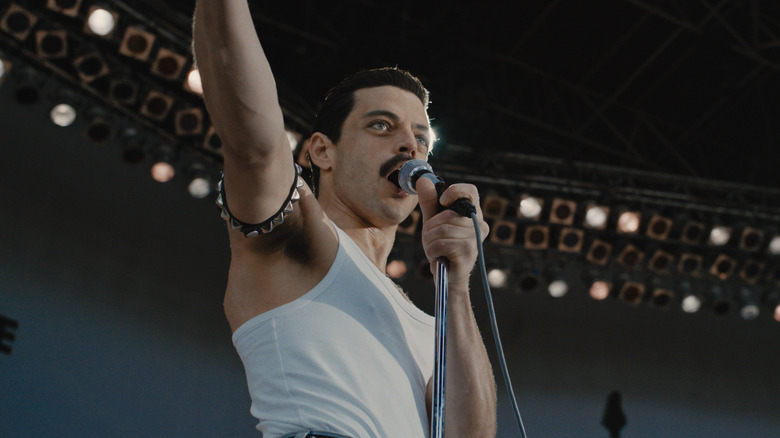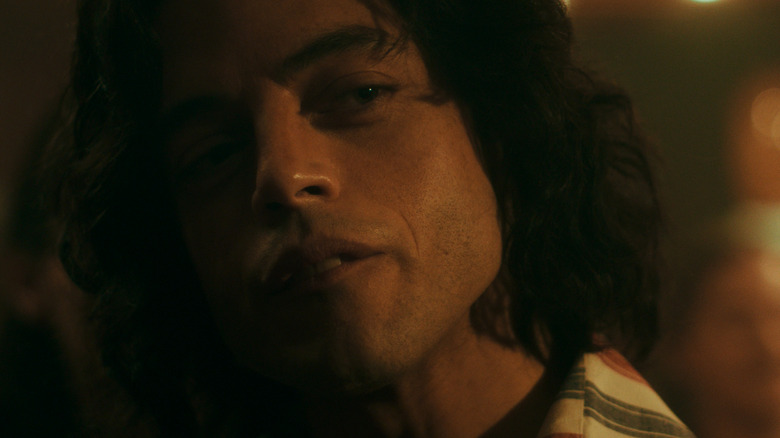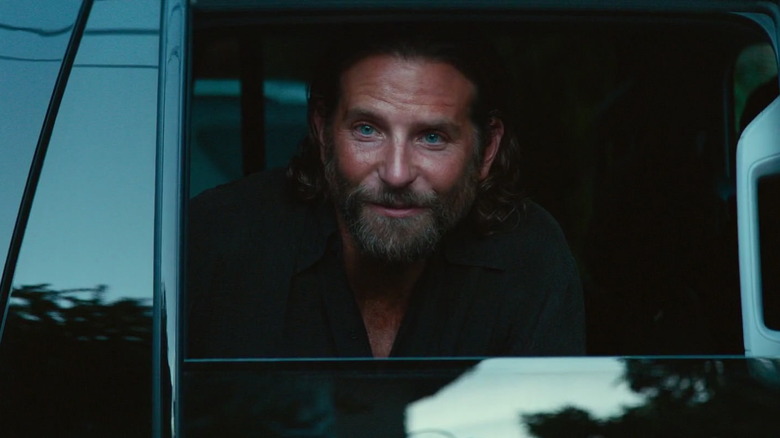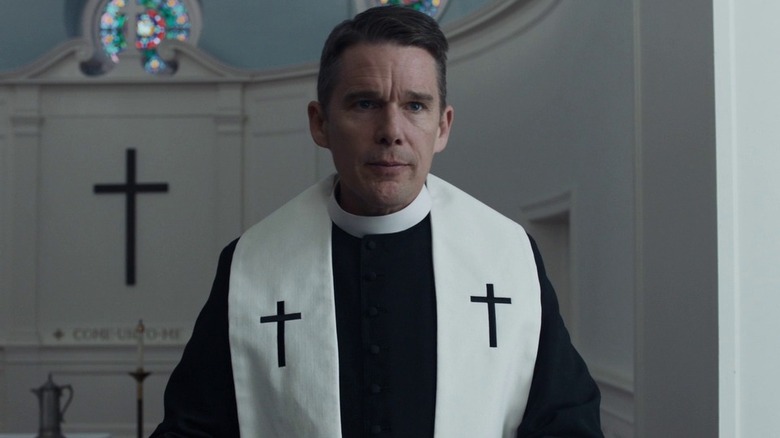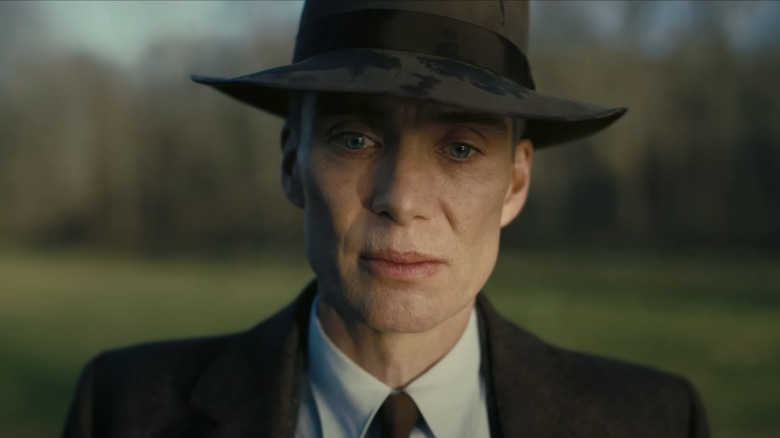The 2019 Oscars Needed A Massive Overhaul In Best Actor
(Welcome to Did They Get It Right?, a series where we look at Oscars categories from yesteryear and examine whether the Academy's winners stand the test of time.)
Since I started this column, I've spotlighted several times where the Academy Awards completely nailed a category, such as Best Actor at the 1994 Oscars or Best Picture at the 1976 ceremony. It's extremely rare for the Oscars to go five for five with their slate of nominees. Most often, they are a mixed bag, featuring a couple of more-than-worthy contenders and a couple who shouldn't be anywhere near the word "best." We have become accustomed to the uneven nature of the categories, and typically, we know that the people we want to win end up losing to the people we don't think should have even been nominated.
We rag on the Oscars for their selections, but they don't make it a habit of choosing a slate of nominees that is completely undeserving. You'll always at least get two or three solid options to root for. Sometimes, though, they just whiff it completely, where there's truly nobody to root for, or they just give you one scrap of goodness to make you think they're not completely off-base. Well, that is exactly what happened when it came to the Best Actor category at the 2019 Oscars.
I'd argue that the Best Actor race was even more disheartening than "Green Book" winning Best Picture this year. Rami Malek took home the award for "Bohemian Rhapsody," beating out the likes of Christian Bale in "Vice," Willem Dafoe in "At Eternity's Gate," and Viggo Mortensen in the Best Actor winner. Few lineups better showcase the Academy's lack of imagination than this one, leaving Bradley Cooper in "A Star Is Born" to be its one saving grace.
The Academy loves a biopic
It's no secret that the actors branch of the Academy has an overwhelming love for biopics. In the 21st Century, there've only been two years where no biopic performances were nominated in the Best Actor category, and the most recent was all the way back at the 2008 ceremony when Daniel Day-Lewis won for "There Will Be Blood." In those 23 ceremonies, 13 of the winners have been for biopic performances. That is a remarkable winning percentage, and one I find immensely troubling.
When playing a person who actually existed, especially one with a popular reputation, evaluating the performance itself can be tricky. Often times, the success of the performance seems like it boils down to whether the actor looked and sounded enough like the actual figure, giving Academy voters easy markers for judging the quality of the work. It's a way of thinking that sounds like, "Gary Oldman sure wore that fat suit and sounded like Winston Churchill in 'Darkest Hour.' Here's an Oscar."
Some folks conflate their admiration for the performance with their own personal history with the figure they are playing. They like being reminded of the musicians, artists, or political figures they vividly remember and want their familiarity to be rewarded. I believe this to be a massive reason as to how Rami Malek won the Oscar for playing Queen frontman Freddie Mercury in "Bohemian Rhapsody." They sat in the theater, watched Malek faithfully recreate Mercury's performances the audience had previously seen, heard Mercury's actual voice, and wanted to give an Oscar to that. Ask them to praise a non-performance scene, and I wouldn't be surprised if they didn't even remember one. I love Freddie Mercury, but that doesn't mean someone doing a passable imitation of him holds a film together.
We've got four biopics
Had Rami Malek been the only biopic performance in the category, that would be one thing, but four of the Best Actor nominations were for playing real people. On the recognizable front, you have Christian Bale playing Dick Cheney in "Vice." The reception to how he portrays the former vice president seems like it would be the opposite of Rami Malek's Freddie Mercury, but it comes from a similar place. Bale's take on Cheney makes sure you know that he thinks Cheney is a bad guy. By taking this tactic, it makes the more liberal-minded Academy feel good about their own political beliefs and thinking they are right about history. Like the aforementioned Gary Oldman in "Darkest Hour," Bale also has the voice and look going for him too.
Though not a terribly recognizable figure, Viggo Mortensen as Tony Lip in "Green Book" is also a performance designed to appeal to the slightly liberal Academy. It's a big, boisterous performance of a racist learning that it's not great to be racist. It affirms the mostly white Academy's belief that they are not racist themselves, which played a big part in the film winning Best Picture.
The other biopic performance is a little more odd, and that is Willem Dafoe playing Vincent Van Gogh in "At Eternity's Gate." Unlike the other three performances we've covered, this is the only one where the film didn't receive widespread Academy recognition. Dafoe is the sole nominee for the film, and while the film does have a different tone and feel from the more crowd pleasing fare, this being the film's only nomination only further cements the actors branch not being able to get enough of biopics. The other branches couldn't be bothered, but the actors couldn't help themselves.
The one we'll take another look at
The only person nominated for Best Actor this year for not playing a real person was Bradley Cooper for his directorial debut "A Star Is Born," in which he played alcoholic roots rocker Jackson Maine. First off, what happened to "A Star Is Born" that awards season? This was a film that received frontrunner status a little too early, it seems. The film was nearly universally acclaimed (including by /Film), proved Cooper to be more than capable behind the camera, cemented Lady Gaga as a true movie star, was an R-rated adult drama that made $436 million worldwide, and produced one of the most beloved pop songs of the last few years with "Shallow," which ended up being the film's only Oscar win. Was it my favorite film of the year? No, but amongst the Oscar hopefuls, it was high on the list.
To hone in on Bradley Cooper as an actor, though, this is the kind of Oscars-friendly performance I love seeing the Academy give recognition to. It's an actor creating an entire person from whole cloth that you could so easily imagine a life for outside of what happens during the film's running time. From the way he hangs his head to that baritone drawl that people still do impressions of today, every detail of Cooper's Jackson Maine has been thoroughly considered and feels far more real than any of the performances actually based on real people. Satisfying drama comes from exploration and not recreation, and because this is the only person in the category we have no prior relationship with, every second with Jackson Maine is exploratory. Of these five nominees, Bradley Cooper would be my winner, and it's not even close. But what if the slate was different?
If I picked the nominees
With these "Did They Get It Right?" pieces, a yes or no answer isn't enough, and I must provide an alternate path for how things could and should have gone. So, let's wipe the Best Actor slate at the 91st Academy Awards clean and begin anew. I only have one rule in creating the new five: there cannot be more than one biopic performance nominated. If the major issue is the prevalence of that kind of role, then there needs to be a limit.
The first spot would go to the already nominated Bradley Cooper for "A Star Is Born." Secondly, we have someone who everyone wanted to see nominated but wasn't: Ethan Hawke for "First Reformed." This performance won Hawke the Best Actor prizes from the Independent Spirit Awards, Gotham Awards, and the New York and Los Angeles Film Critics, but ultimately, this was always going to be too abrasive and odd for the actors branch, even if the writers did give a nod to Paul Schrader for Best Original Screenplay.
My one biopic slot goes to a performance that pushes back against everything people typically want from a biopic performance, and that's Ryan Gosling as Neil Armstrong in "First Man," whose take on the U.S. icon is so quiet and haunted that you are constantly wondering what's wrong with him. For an even more quiet and haunted performance, my fourth slot goes to Ben Foster for Debra Granik's severely underseen "Leave No Trace." My fifth and final entry would be LaKeith Stanfield for Boots Riley's gonzo capitalism satire "Sorry to Bother You."
Of those five, Hawke takes home the award, but as a full slate, I feel that is a far more exciting group of names than the one the Academy gave us.
Looking to the future
I don't typically look ahead to future Oscars in this series, as I am more concerned with the history, but I feel it to be necessary in this instance. When we get to March 10, 2024, for the 96th Academy Awards, I have a fear that we may run into a biopic buzzsaw in Best Actor again, and that depresses me. Without most of these movies being released yet, I can already foresee a Best Actor category that is mostly — if not entirely — comprised of actors portraying real people. We have already seen one major contender who will most certainly be nominated this year already in Cillian Murphy for "Oppenheimer." Alongside him, it would not shock me in the slightest to see any of the following: Leonardo DiCaprio in "Killers of the Flower Moon," Adam Driver in "Ferrari," Joaquin Phoenix in "Napoleon," Bradley Cooper in "Maestro," Colman Domingo in "Rustin," Paul Dano in "Dumb Money," or even Matt Damon in "Air," depending on how the strikes affect the fall release schedule. That's already more names than the category can fill, and those were just the ones off the top of my head.
Even at this point in the year, you could make a fascinating slate of Best Actor nominees with Joaquin Phoenix in "Beau Is Afraid," Jason Schwartzman in "Asteroid City," Teo Yoo in "Past Lives," Franz Rogowski in "Passages," and Cillian Murphy as the sole biopic representative. You could even make a strong case that Ryan Gosling belongs in this category for "Barbie." It's high time for the actors branch of the Academy to reevaluate what makes a great and awards-worthy performance. Great acting should never come down to a list of easily identifiable attributes, but the 2019 Oscars sure make it seem that way.
